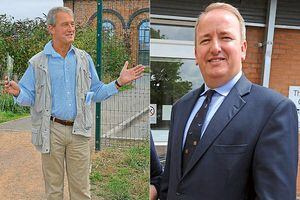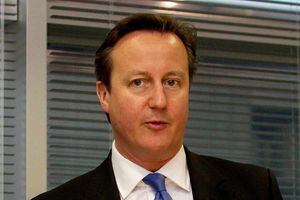Shropshire MP Owen Paterson's new EU bombshell
If David Cameron thought his promise of a referendum on Britain's place in the European Union would put the debate to bed, he is probably feeling rather disappointed at the moment, writes Mark Andrews.

Days after Mark Reckless became the second defecting Tory MP to win a seat for Ukip, Shropshire MP Mark Pritchard revealed that he too had considered switching to the Eurosceptic party, before deciding to stay with the Tories.
And now, in the latest political grenade to be thrown by a Tory backbencher, former minister and North Shropshire MP Owen Paterson has called for Britain to quit the union and instead try to negotiate a Norway-style trade agreement where Britain would continue to access the European single market from outside the EU.

Both the Prime Minister and Ed Miliband are paying a price for underestimating Ukip. Veteran Westminster commentator Chris Moncrieff reports on a possible seismic change in politics.
David Cameron should be hanging his head in shame. He completely misjudged the ability of Ukip to attract the voters and made a complete shambles of dealing with this new threat at the Rochester and Strood by-election.
The result was a humiliating defeat of the Tories whose nearly 10,000 majority in this constituency at the last general election was simply blown away.
Cameron boasted beforehand that the Conservatives would "throw the kitchen sink" at this by-election campaign. Well, that was mistake Number One.
There were something like 100 ministerial visits during this campaign, including no fewer than five by the Prime Minister himself. Has he not heard of overkill? Did it not occur either to him or his advisers that the voters in this constituency would get fed up with the sight and sound of obsequious blue-rosetted people constantly banging at their front doors?
Nor does he appear to have learned that you do not lure defecting voters back into your fold by insulting them as "fruitcakes" and "loonies". That really was a crass and potentially hugely damaging thing for him to have done. It is hard to believe that a man of Cameron's considerable brain power did not realise this at the time.
I remember some fellow Tories looking shocked and incredulous when he actually delivered that insult.
What Cameron – and others – have also failed to take on board is that Ukip speaks the language that people understand and promises to try to do what the voters want done, rather than the tendency of the two big parties to do what they think is good for the electorate.
They may accuse Ukip of jumping on every passing bandwagon. Well, what is so wrong with that? The object in politics is to win votes, and you do that by offering the voters what they are demanding. So, it's back to the drawing board for Cameron as Ukip threatens to change the face of British politics.
The situation appears to be no less bleak for Mr Miliband. His party came a scarcely impressive third at Rochester and Strood (once a Labour-held constituency) amid the blazing row over Emily Thornberry, who was sacked as shadow Attorney General for making what have been described as "snooty" comments about the Cross of St George flags and a white van at the home of a man who lives in the constituency.
What made it worse for the Labour leader is that Ms Thornberry appears to exemplify what has been termed "the champagne socialist" and her infamous and contemptuous tweet may well have damaged Labour's performance at Rochester.
Former Environment Secretary Mr Paterson says the Prime Minister should invoke Article 50 of the Lisbon Treaty, which would trigger a two-year mechanism to negotiate Britain's departure from the EU immediately after the election.
He says the people of Britain should then be offered a stark choice in any referendum which followed – to either become a fully-fledged member of the European project, joining the euro and signing up to full political and economic union — or leaving the EU.
Mr Paterson also says that Eurosceptics must make a clear and positive case for Britain outside Europe in the run-up to any such referendum, warning that a fear of the unknown is otherwise likely to sway people to sticking with the status quo.
That would certainly seem to be the case among business leaders in Shropshire.
Earlier this year, Shropshire Chamber of Commerce canvassed the opinions of its members on the impact of leaving the union, with nearly 73 per cent of businesses said that complete withdrawal would be bad for them, compared with just under 12 per cent who viewed it as a positive move.
Significant income
However, when members were asked for their views on transferring specific powers back to Westminster, while remaining within the EU, the response was much more positive: 59.3 per cent were in favour of such a move, and 6.7 per cent against.
Chief executive Richard Sheehan said: "The consensus of businesses we have surveyed follows the national picture in terms of maintaining a presence in Europe, but renegotiating our ability to control our own destiny.
"It's a substantial market that has relatively simple access compared to some countries further afield, and provides significant income to Shropshire that knocks on to the people they employ.
"We want to retain and increase control of legislation, have the choice of what we do and don't get involved with, and ensure we have a voice as it's important that we retain a place at the table."
That would largely reflect the Prime Minister's position. Mr Cameron has said he would negotiate hard for changes to the terms of Britain's membership ahead of the 2017 referendum.
But Mr Paterson doubts Britain's ability to negotiate any meaningful concessions or reform.
"There is little we can do to change things from the inside, as we are outvoted," he said. "When we joined, the UK had 20 per cent of the votes in the European Parliament, today we have 9.5 per cent.
"The UK has not managed to block a single proposal from the Commission passing through the council despite trying 55 times."
Mr Pritchard's revelation will have served as a warning to many around Westminster about the discontent about Britain's relationship with Europe is still very much alive on the Conservative backbenches, and indeed probably in other parties too.
He says he now believes that Nigel Farage's surge in popularity could be on the wane, and that the next General Election will be a straight choice between David Cameron or Ed Miliband.
Nevertheless, Mr Pritchard believes Europe is an issue which is not going to go away.
And while he questions some of the finer nuances of what Mr Paterson is proposing, he praises him for raising the issue, and he too agrees that Britain cannot stay in the EU without radical change.
He says Mr Paterson's suggestion that Britain could join the European Economic Area, like Norway, would be an improvement on the present situation, but would would prefer a relationship more akin to that of Switzerland, which is a member of the European Free Trade area.
Mr Pritchard said: "If Europe doesn't reform then Brussels will only have itself to blame if the British people vote to leave. I am glad that if the Conservatives win the next election there will be a referendum in 2017."
Amid all the fuss about Europe coming from the Conservatives and Ukip, there are still politicians who say we are best placed within Europe.
Labour MP for The Wrekin David Wright says he believes it is vital that Britain remains in the EU for the economic future of Shropshire.
"Access to the single market is absolutely crucial for the long-term growth of the UK," he says.
"Companies across Telford tell me that our membership of the EU is crucial to their long-term success."
Mr Paterson is not suggesting that Britain should leave the European Single Market, but rather that it should negotiate a settlement where Britain negotiates an exit from the political dimension to the EU, while continuing to maintain trade links.
However, Mr Wright is not convinced that a future Government would be able to deliver such a deal. "I'm not sure that works," he says.
"Our economy is much bigger than that of a country like Norway, and access to that single market is absolutely crucial.
"I accept we do need to have a potential renegotiation regarding elements of our membership of the EU, but I think we should do that while retaining our membership."
However, Mr Paterson argues that the European Union would be very reluctant to lose one of its most lucrative export markets. He points out that in 2013, the UK imported £221 billion of goods from mainland Europe, supporting five million jobs.
"We exported £155 billion of goods to the bloc, leaving a deficit on account of £66 billion, up from £40 billion in 2011," he says.
"We imported £57 billion worth of goods from Germany and £24 billion from France, with a surplus between these two countries of £30 billion.
"Given these surpluses, it is hard to imagine that our EU trading partners would wish to break off trading relations.
"To suggest that leaving the EU would put at risk three million jobs attributed to UK exports to the EU is, therefore, puerile because we will continue to export to the single market.
"The EU does not deliver jobs. It is the Single Market which delivers. We can leave the political project and enter into a truly economic project with Europe. We would still enjoy the trading benefits of the EU, without the cost of the political baggage."





